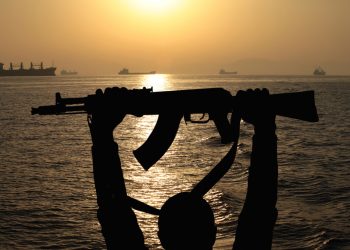Fisheries crime is diverse category of criminality that can include corruption, fraud, human and drugs trafficking as well as piracy.
According to research by The Conversation, illegal fishing is undermining people’s livelihoods, while the lack of government support to tackle this issue makes people even more vulnerable to criminal networks.
In fact, people that are in the fishing business may actually end up participating in, and being victimised by, fisheries crime as a result.
This is showcased by the rising criminality through incidents of piracy and armed robbery at sea throughout Nigeria’s coastal communities.
What is more, another factor for maritime insecurity is gender. Namely, women in West African fisheries experience unique challenges like poor access to capital, growing competition for access to depleting fish stocks, as well as policy exclusion.
To address piracy, Nigeria launched the Deep Blue Project, in order to tackle piracy and maritime crime in its waterways and the Gulf of Guinea.
To support the project a Special Mission Aircraft was received, indicating the the final phase of the delivery and installation of assets under the Deep Blue Project.
Under this light, Director General of the Nigerian Maritime Administration and Safety Agency (NIMASA), Dr. Bashir Jamoh, revealed a drastic reduction in the rate of attacks in the country’s Exclusive Economic Zone (EEZ) with the deployment of the Deep Blue Project assets:
There has been a drastic decrease in the rate of security breaches in our waters in recent times. This is a clear indication that we are getting it right with the Deep Blue Project. The figures we are getting from the International Maritime Bureau (IMB) are encouraging. We ultimately aim to completely eradicate security hindrances to shipping and business generally in the Nigerian maritime domain
According to the latest IMB quarterly report of piracy and armed robbery against ships recorded only two incidents in Nigerian waters between January and March this year, compared to 11 attacks within the same period last year.

































































